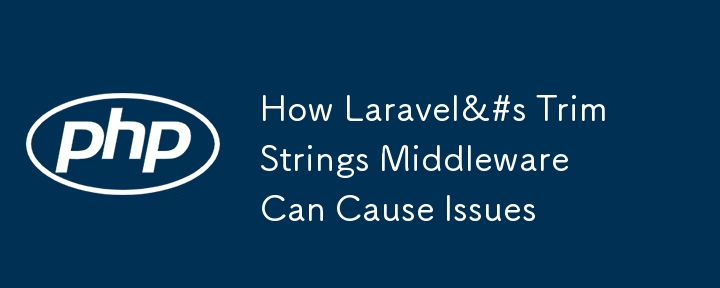

Laravel is a popular framework in the PHP world, offering developers great tools to simplify their work. However, sometimes these conveniences can lead to unexpected problems. In this post, I'll discuss how theTrimStringsmiddleware in Laravel can cause issues and how to solve them.
TheTrimStringsmiddleware is used in Laravel applications to automatically trim whitespace from incoming request data, such as form inputs. This is particularly useful when users accidentally leave spaces at the beginning or end of input fields. For example, if a user enters " user@example.com " with spaces around the email address in a form, theTrimStringsmiddleware will trim these spaces, ensuring that only "user@example.com" is processed.
This feature is beneficial for preventing errors caused by unnecessary whitespace and for handling cleaner data. However, as always, in certain special cases, this default behavior can lead to unintended consequences.
In a project where we were integrating with a Brazil-based payment provider, we needed to capture and validate payment results through a callback system. The payment provider sends the transaction result to our server via a POST request, and we validate the request by performing asignature/hash verification.
This verification process follows a straightforward logic:
Initially, it was difficult to understand why some valid requests were being rejected. However, after inspecting the Nginx logs, we noticed that thefull_nameparameter in the incoming request retained trailing spaces. Despite this, on our server, these spaces had been trimmed, causing the hash verification to fail. That’s when we realized that the TrimStrings middleware was causing this issue.
To avoid such problems, it is necessary to disable theTrimStringsmiddleware for specific routes or requests. Laravel 8 introduced theTrimStrings::skipWhenmethod, which provides a tailored solution for this situation.
Below is an example of how to apply this solution using a provider:
use Illuminate\Foundation\Http\Middleware\TrimStrings; use Illuminate\Http\Request; // ... TrimStrings::skipWhen(function (Request $request) { return $request->is('api/v1/integrations/foo-provider/callback'); });
This code snippet disables the TrimStrings middleware for a specific route. In this case, trimming will not occur for requests coming from the api/v1/integrations/foo-provider/callback route, ensuring that the hash verification process works smoothly.
Laravel's default features generally make things easier, but in certain scenarios, they can lead to unexpected results. Therefore, it’s important to understand how the tools we use operate and to carefully evaluate their potential impacts. While theTrimStringsmiddleware is a useful tool in most cases, it can cause issues in scenarios like this. Fortunately, flexible solutions likeTrimStrings::skipWhenallow us to avoid such problems.
Atas ialah kandungan terperinci Bagaimana Perisian Tengah TrimStrings Laravel Boleh Menyebabkan Isu. Untuk maklumat lanjut, sila ikut artikel berkaitan lain di laman web China PHP!
 Cara menggunakan fungsi max
Cara menggunakan fungsi max Mengapa komputer dimulakan semula secara automatik?
Mengapa komputer dimulakan semula secara automatik? Bagaimana untuk menentukan pembolehubah dalam golang
Bagaimana untuk menentukan pembolehubah dalam golang Bagaimana cara menaip tulisan pada bulatan syiling?
Bagaimana cara menaip tulisan pada bulatan syiling? Apakah perisian lukisan?
Apakah perisian lukisan? Pesanan yang disyorkan untuk mempelajari bahasa c++ dan c
Pesanan yang disyorkan untuk mempelajari bahasa c++ dan c pemalam tencent qqmail
pemalam tencent qqmail Bagaimana untuk mengekalkan dua tempat perpuluhan dalam c++
Bagaimana untuk mengekalkan dua tempat perpuluhan dalam c++



